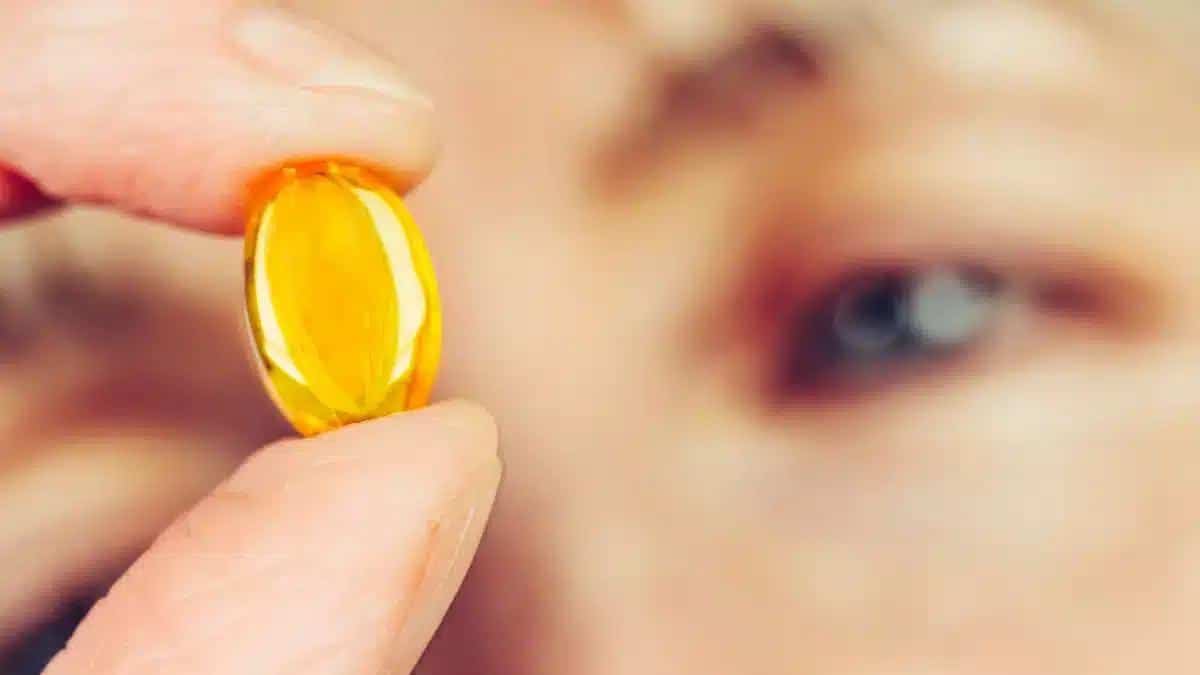Dry eye is an eye disease where your eyes don’t produce enough tears to keep them lubricated.
This, in turn, causes impaired vision, red eye or irritation in the eyes, and a burning or stinging feeling in the eyes.
There are several treatment options available for dry eyes, including surgeries, eye drops, and home remedies like fish oil.
Continue reading to find out if fish oil for dry eyes is effective or not.
Can fish oil help with dry eyes
Many individuals wonder if consuming fish or fish oil can help manage their dry eye symptoms.
Omega-3 fatty acids found in fish oil possess anti-inflammatory properties that can treat dry eyes.
However, additional research is required to determine whether omega-3s can specifically assist dry eye treatment or not.
One can have fish oil in the form of a supplement for Dry Eyes available in liquid or capsule form.
Fish oil can also be obtained by eating oily fish like tuna, salmon, and trout.
Docosahexaenoic Acid (DHA) and Eicosapentaenoic Acid (EPA) are two omega-3 fatty acids found in fish oil.
Omega-3s from fish oil have anti-inflammatory and antioxidant qualities that provide several health advantages.
These omega-3 fatty acids help boost the creation of the oil that makes up a portion of your tears.
EPA and DHA also aid in lowering inflammation throughout the body, including the region around the eyes thus treating dry skin around the eyes.
However, the benefits of DHA and other omega-3 fatty acids for treating and preventing dry eye are still being investigated by researchers.
The American Academy of Ophthalmology (AAO) states that omega-3 oils may enhance meibomian gland function that aid in overcoming dry eye symptoms.
Dry eyes can occur due to issues with the oily layer of tears.
According to the AAO, the omega-3s in fish oil can reduce inflammation of the eyelids or front surface, thus helping relieve the symptoms of dry eye.
In a 2016 study, it was found that EPA and DHA supplementation shows a substantial reduction in dry eye symptoms.
Also, it has been found that omega-3 can aid in decreasing ocular inflammation following cataract surgery.
This further helps in treating dry eye after the cataract surgery.
According to another study, omega-3 fatty acids can help protect corneal nerves in dry eyes from further damage.
Dry eye can result from several environmental and medical causes. Read our article: Common Dry Eye Causes and Effects to discover different causes of dry eye.
Buy Restasis 0.05% Ophthalmic Emulsion 0.4ml today from GoodRxMedicine to reduce eye irritation and get clear vision.
Risks associated with fish oil

Usually, most people consider fish oil as a safe alternative when it comes to treating dry eye.
However, it may pose some risk for certain individuals.
Fish oil may lead to some mild side effects like bad breath, odorous sweating, headaches, and gastrointestinal issues.
If you take Warfarin or another blood-thinning medication, you should consult your doctor before considering fish oil.
Omega-3 in fish oil interacts with these medications and may impair blood clotting.
Also, it may be necessary for children and those who are pregnant or nursing to see a healthcare provider before consuming specific kinds of fish or taking fish oil.
This is because some fishes have high mercury content that may affect health.
Besides medical treatments, dry eyes can be treated naturally at home. Read our article: Know the Best Home Remedies for Dry Eyes
Conclusion
Dry eye may affect your quality of life.
However, eye drops and surgery may help people overcome the painful symptoms of dry eye.
Besides these treatment approaches, most people find fish oil for dry eyes to be highly effective.
Several studies suggest that Docosahexaenoic acid and Eicosapentaenoic acid found in fish oil may help relieve dry eye symptoms.
But, more research is needed to establish the facts.
One can have fish oil from supplements or fish like tuna and salmon.
It is important to talk to a healthcare provider before considering any supplements.
Take a closer look at Dry Eye allergy with our article: Understanding Dry Eye Allergy: Causes, Symptoms, and Treatment
Buy the most trustworthy eye care products from GoodRxMedicine and embrace a life free from dry eye discomfort.
Frequently Asked Questions
Does fish oil help with dry eyes?
Yes, Docosahexaenoic acid (DHA) and Eicosapentaenoic acid (EPA), the two omega-3 fatty acids found in fish oil, help overcome symptoms of dry eye.
How much fish oil should I take for dry eyes?
It has been found that the recommended daily intake (RDI) for combined EPA and DHA found in fish oil is 250–500 mg.
How do you use fish oil for dry eyes?
Fish oil can be taken as a supplement in the form of capsules or liquids. It can also be consumed from fish like tuna and salmon.
How much time does fish oil take to relieve dry eyes?
Scientists believe that fish oil takes around six to twelve weeks to relieve dry eyes when consumed regularly.
Is there any side effect of fish oil?
Yes, when consumed in excess, fish oil can lead to bad breath, odorous sweating, headaches, and gastrointestinal issues.
When referencing outside resources, GoodrxMedicine always provides full citations. To learn more about the measures we use to maintain the quality of our content, please review our Content Information Policy.











